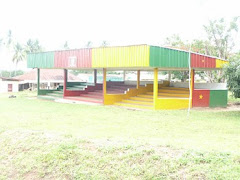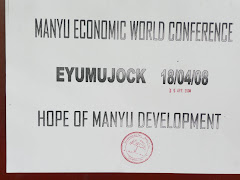 From the Americas through Europe to Africa, the Manyu Diaspora’s role in the development of its division continues to decline as compared to similar ethnic groupings. Groups from Cameroon, and other African countries like Nigeria, have time and again jointly committed substantial resources during conventions, and other annual gatherings to raise funds and implement major projects in their homelands of origin. Lately, instead of moving forward, the Manyu Diaspora has shown a tendency to divide and conquer, argue, bicker, belittle one another, disrespect elders and women and at the same time lack a sense of humility. We all want to be leaders with no followers even when it means burning down the same house it took us years to build. Whatever happened to the community spirit, sense of purpose and one voice (eyongemot)? Is our arrogance a curse or a genetic disposition?
From the Americas through Europe to Africa, the Manyu Diaspora’s role in the development of its division continues to decline as compared to similar ethnic groupings. Groups from Cameroon, and other African countries like Nigeria, have time and again jointly committed substantial resources during conventions, and other annual gatherings to raise funds and implement major projects in their homelands of origin. Lately, instead of moving forward, the Manyu Diaspora has shown a tendency to divide and conquer, argue, bicker, belittle one another, disrespect elders and women and at the same time lack a sense of humility. We all want to be leaders with no followers even when it means burning down the same house it took us years to build. Whatever happened to the community spirit, sense of purpose and one voice (eyongemot)? Is our arrogance a curse or a genetic disposition?Credible data on the number of Manyu elements pursuing education or working as professionals abroad is lacking. However, estimates put the number of our people overseas at close to a few thousands. The irony is that, this vast wealth of economic power consisting of students and professionals has not done much collectively to advance economic and social development back home. Whereas many belong to organizations like MECA and NOMA, the average contributions from individuals on enlisted projects has been very little to make an impact. MECA has for many years been run as a cultural organization and has been successful in promoting our rich culture abroad. However, cultural preservation alone will not foster needed development. We must start to embrace economic and social initiatives as part of the overall MECA development framework. For some, the status quo of relishing in our comfort and privileges while our division continues to struggle is simply unacceptable. We need to do much more in the long term to ensure that Manyu once again become the beacon of hope for the younger generation. This noble vision can be achieved. All it takes is the initiative, leadership and “a can do attitude”. When each of us collectively and through partnerships decides to do something, the cumulative effect can be huge. What then is our role in the development of Manyu? The answer is, there is none for now unless we reassess our priorities and become proactive.
Portion of the Mamfe - Ekok Road (soon to be tarred - ADB project)
 As Manyu awaits the completion of the Numba – Bachuo road and the eventual tarring of Ekok- Mamfe, the Manyu Diaspora is well placed now more than ever to not only help in strengthening support, but more importantly make practical economic contribution to accelerate growth and development. There is no question that the Diaspora is seen and regarded as an important stakeholder. After all, it has at its disposition the highest number of intellectuals and high income earners out of the division who collectively or as individuals can make an everlasting impact in development. It is true some have started, but only a minority who truly believe they can make a difference are doing so.
As Manyu awaits the completion of the Numba – Bachuo road and the eventual tarring of Ekok- Mamfe, the Manyu Diaspora is well placed now more than ever to not only help in strengthening support, but more importantly make practical economic contribution to accelerate growth and development. There is no question that the Diaspora is seen and regarded as an important stakeholder. After all, it has at its disposition the highest number of intellectuals and high income earners out of the division who collectively or as individuals can make an everlasting impact in development. It is true some have started, but only a minority who truly believe they can make a difference are doing so.Custodians of the rich Manyu culture - display Ekpe attire
 Without dwelling on the role of the MECA’s abroad which have become weakened in recent times due to infighting and squabbles, the Manyu Diaspora has organized itself into a myriad of small groups. Groups such as subdivisions, villages, quarters and even families do co-exist with each involved in some form of development effort and virtual networks. Despite their small memberships, these unique groups enhance culture and provide long term commitment to the development of their communities with modest efforts. It is therefore reasonable to surmise that, grand style development programs can still originate from these groups if properly planned. Now is the time therefore for the Diaspora to wake up and provide the necessary impetus for its development. We believe such contributions can come in the following areas:
Without dwelling on the role of the MECA’s abroad which have become weakened in recent times due to infighting and squabbles, the Manyu Diaspora has organized itself into a myriad of small groups. Groups such as subdivisions, villages, quarters and even families do co-exist with each involved in some form of development effort and virtual networks. Despite their small memberships, these unique groups enhance culture and provide long term commitment to the development of their communities with modest efforts. It is therefore reasonable to surmise that, grand style development programs can still originate from these groups if properly planned. Now is the time therefore for the Diaspora to wake up and provide the necessary impetus for its development. We believe such contributions can come in the following areas:
Part II – to be continued.




























No comments:
Post a Comment